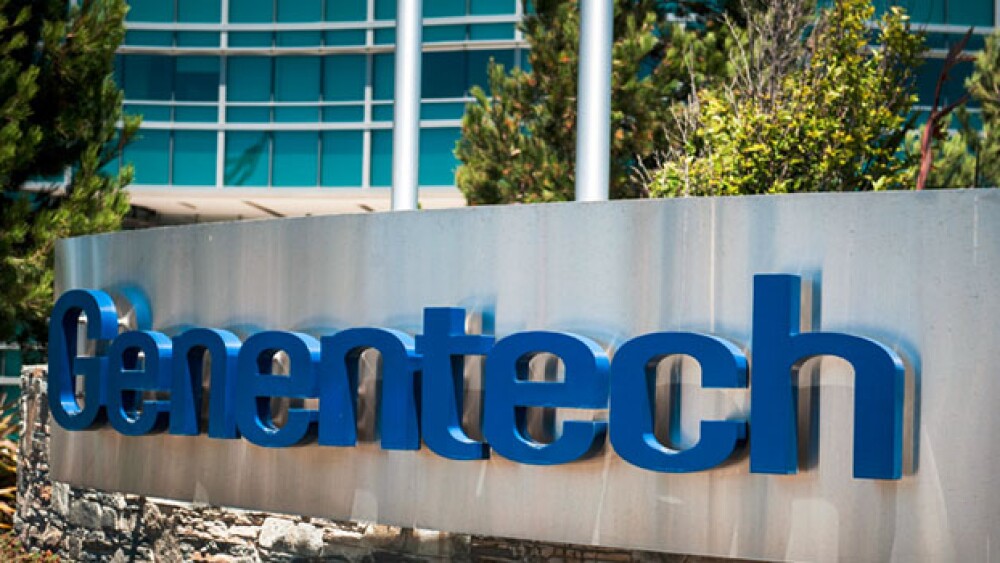The U.S. Food and Drug Administration (FDA) granted Genentech’s Tecentriq triple combination with Avastain (bevacizumab), paclitaxel and carboplatin (chemotherapy) Priority Review for first-line treatment of patients with metastatic non-squamous non-small cell lung cancer (NSCLC).
The U.S. Food and Drug Administration (FDA) granted Genentech’s Tecentriq triple combination with Avastain (bevacizumab), paclitaxel and carboplatin (chemotherapy) Priority Review for first-line treatment of patients with metastatic non-squamous non-small cell lung cancer (NSCLC). The agency also accepted the supplemental Biologics License Application (sBLA).
The sBLA was based on data from the Phase III IMpower150 trial, which met its co-primary endpoints of overall survival (OS) and progression-free survival (PFS). The safety data was consistent with the safety profiles of each of the individual medicines.
Tecentriq is one of five currently commercially available PD-1/L1 drugs, inclulding Bristol-Myers Squibb’s Opdivo, Merck’s Keytruda, AstraZeneca’s Imfinzi and Pfizer/Merck KGaA’s Bavencio.
If this combination therapy is approved, it should help Genentech and its parent company, Roche, remain in the competition for anti-PD/L1 drugs. Bristol-Myers Opdivo brought in $1.51 billion in this year’s first quarter, followed by Merck’s Keytruda, which brought in $1.46 billion in the same quarter. Tecentriq is far behind, bringing in $139 million in the first quarter.
And the market is expected to get even more crowded, with Sanofi and Regeneron Pharma’s cemiplimab reporting positive Phase III data in December for advanced cutaneous squamous cell carcinoma (CSCC), a type of skin cancer, and a regulatory submission in the first quarter of 2018.
The FDA will make a decision on cemiplimab by October 28, 2018. It has also been granted a priority review. The FDA will also consider Phase I data from two advanced CSCC expansion cohorts. The drug is also being reviewed in Europe. The European Medicines Agency (EMA) accepted the Marketing Authorization Application in early April.
There are also three more checkpoint inhibitors being reviewed in China, with many more being evaluated in the clinic. The Journal of Hematology & Oncology reported in July 2017, that Chinese pharmaceutical companies have developed eight anti-PD-1/PD-L1 inhibitors as of January 7, 2017, and four of those drugs had been approved by Chinese regulatory officials for Phase I clinical trials in patients with advanced solid tumors and NSCLC. “Another four drugs,” the authors wrote, “(Jirnuo monoclonal antibodies, GLS-0101, KN035, and WBP3155) are now being considered by the CFDA for clinical trial approval. In November 2016, the PD-1 inhibitor KN035, that is administered by subcutaneous injection, received approval from the American Food and Drug Administration for clinical trial conduction.”
Tecentriq has been approved by the FDA for people with metastatic NSCLC whose disease has progressed during or after platinum-containing chemotherapy, and have progressed on an appropriate FDA-approved targeted therapy if their cancer has ALK or EGFR gene abnormalities.
“Our Phase III results showed Tecentriq in combination with Avastin, paclitaxel and carboplatin has the potential to provide a significant survival benefit in the initial treatment of metastatic non-squamous non-small cell lung cancer,” said Sandra Horning, Roche’s chief medical officer and head of Global Product Development, in a statement. “We are working closely with the FDA to bring this treatment regimen to people with this type of lung cancer as soon as possible.”





